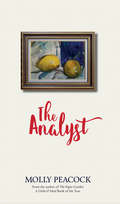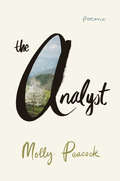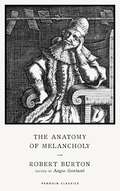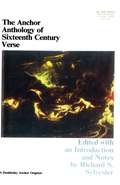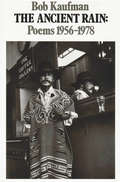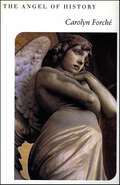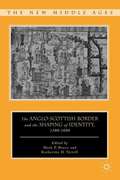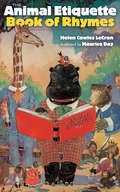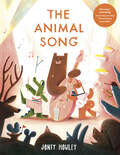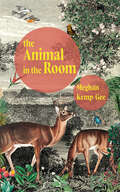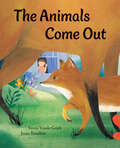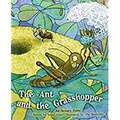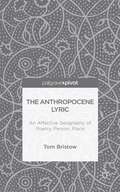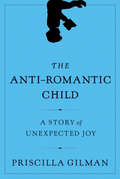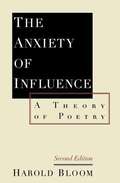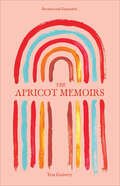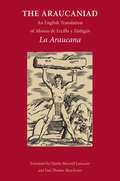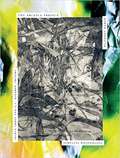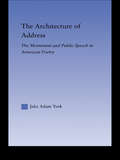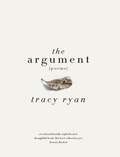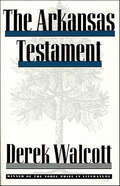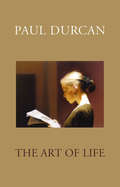- Table View
- List View
The Analyst
by Molly PeacockWhen a psychoanalyst became a painter after surviving a stroke, her longtime patient, distinguished and beloved poet Molly Peacock, took up a unique task. The Analyst is a new, visceral, twenty-first century "in memoriam" of ambiguous loss in which Peacock brilliantly tells the story of a decades-long patient-therapist relationship that now reverses and continues to evolve. Peacock invigorates the notion of poetry as word-painting: A tapestry of images, from a red enameled steamer on a black stove to Tibetan monks funneling glowing sand into a painting, create the backdrop for her quest to define identity. From "In Our Unexpected Future":. . . for frocks outlast pillars. But feelingsoutlive frocks. The immaterial storms through,a force beyond years (a mere four since youwere nearly felled). It isn't what happened that lasts. Not art, either, but the savory core. What's felt.
The Analyst: Poems
by Molly Peacock“Whatever the subject, rich music follows the tap of Molly Peacock’s baton.”—Washington Post When a psychoanalyst became a painter after surviving a stroke, her longtime patient, distinguished and beloved poet Molly Peacock, took up a unique task. The Analyst is a new, visceral, twenty-first century “in memoriam” of ambiguous loss in which Peacock brilliantly tells the story of a decades-long patient-therapist relationship that now reverses and continues to evolve. Peacock invigorates the notion of poetry as word-painting: A tapestry of images, from a red enameled steamer on a black stove to Tibetan monks funneling glowing sand into a painting, create the backdrop for her quest to define identity. From “In Our Unexpected Future”: …for frocks outlast pillars. But feelings outlive frocks. The immaterial storms through, a force beyond years (a mere four since you were nearly felled). It isn’t what happened that lasts. Not art, either, but the savory core. What’s felt.
The Anatomy of Melancholy
by Robert BurtonCelebrating the 400th anniversary of Burton's masterpiece, this fully edited, modern edition is published as a landmark hardback volume in Penguin Classics. Robert Burton's labyrinthine, beguiling, playful masterpiece is his attempt to 'anatomize and cut up' every aspect of the condition of melancholy, from which he had suffered throughout his life. Ranging over beauty, digestion, the planets, alcohol, demons, kissing, poetry and the restorative power of books, among many other things, The Anatomy of Melancholy has fascinated figures from Samuel Johnson to Jorge Luis Borges since the seventeenth century, and remains an incomparable examination of the human condition in all its flawed, endless variety.
The Anchor Book of Sixteenth Century Verse
by Richard D. SylvesterThis comprehensive anthology contains selections from the work of twenty-five poets of the sixteenth century. Employing the original, rather than normalized, texts, the volume includes complete, non-excerpted poems by John Skelton, Philip Sidney and others. The selections - which include such works as 'The Steele Glass'. Richard S. Sylvester examines the evolution of English poetry through the century, tracing the development of the early Tudor poets through the eloquence of Surrey.
The Ancient Quarrel between Philosophy and Poetry
by Raymond BarfieldFrom its beginnings, philosophy's language, concepts, and imaginative growth have been heavily influenced by poetry and poets. Drawing on the work of a wide range of thinkers throughout the history of western philosophy, Raymond Barfield explores the pervasiveness of poetry's impact on philosophy and, conversely, how philosophy has sometimes resisted or denied poetry's influence. Although some thinkers, like Giambatista Vico and Nietzsche, praised the wisdom of poets, and saw poetry and philosophy as mutually beneficial pursuits, others resented, diminished or eliminated the importance of poetry in philosophy. Beginning with the famous the passage in Plato's Republic in which Socrates exiles the poets from the city, this book traces the history of the ancient quarrel between philosophy and poetry through the works of thinkers in the Western tradition ranging from Plato to the work of the contemporary thinker Mikhail Bakhtin.
The Ancient Rain, Poems 1956-1978
by Bob Kaufman"Mr. Kaufman has a genuine lyric talent, and his poetry is sensuous, exciting, and charged with vitality." —Publishers Weekly The Ancient Rain: Poems 1956-1978 is San Francisco poet Bob Kaufman’s third collection and his first to be published since the late 1960s. One of the original Beat poets (the coinage "beatnik" is his), Kaufman’s work has always been essentially improvisational, often done to jazz accompaniment. And he became something of a legendary figure at the poetry readings in the early days of the San Francisco renaissance of the 1950s. With his extemporaneous technique, akin in many ways to Surrealist automatic writing, he has produced a body of work ranging from a visionary lyricism infused with satirical, almost Dadaistic elements to a prophetic poetry of political and social protest. Born in New Orleans of mixed Black and Jewish parentage, Kaufman was one of fourteen children. During twenty years in the Merchant Marine, he cultivated an intense taste for literature on his long sea voyages. Settling in California, in the ’50s, he became active in the burgeoning West Coast literary scene. Disappointment, drugs, and imprisonment led him to take a ten-year vow of complete silence that lasted until 1973. The present volume includes previously uncollected poems written prior to his pledge and newer work composed in the years 1973-1978, before the poet once again lapsed into silence.
The Angel of History
by Carolyn ForchéPlaced in the context of twentieth-century moral disaster--war, genocide, the Holocaust, the atomic bomb--Forche's ambitious and compelling third collection of poems is a meditation of memory, specifically how memory survives the unimaginable. The poems reflect the effects of such experience: the lines, and often the images within them, are fragmented discordant. But read together, these lines become a haunting mosaic of grief, evoking the necessary accommodations human beings make to survive what is unsurvivable. As poets have always done, Forche attempts to give voice to the unutterable, using language to keep memory alive, relive history, and link the past with the future.
The Anglo-Scottish Border and the Shaping of Identity, 1300–1600
by Mark P. Bruce Katherine H. Terrell"Theorizing the Borders: Scotland and the Shaping of Identity in Medieval Britain" explores the roles that Scotland and England play in one another's imaginations. This collection of essays brings together eminent scholars and emerging voices from the frequently divergent fields of English and Scottish medieval studies to address such questions as: How do subjects on both sides of the Anglo-Scottish border define themselves in relation to one another? In what ways do they influence each other's sense of historical, cultural, and national identity? What stories do they tell about one another, and to what ends? How does the shifting political balance - as well as the shifting border - between the two kingdoms complicate notions of Scottishness and Englishness? What happens to important texts, genres, and even poetic forms when they cross this border? How do texts produced in the Anglo-Scottish borderlands transform mainstream notions of Scottish and English identities?
The Animal Etiquette Book of Rhymes
by Helen Cowles Lecron Maurice Day"This is a charming book of poetry that serves many purposes for the classroom: art, language arts, and social studies. The illustrations are charming, the poetry is catchy and gets the point across, and the etiquette lessons are very clear. Young children will enjoy this as a read aloud, older children will find the humor in the poems as they read the book themselves." -- Mama-GraphySamuel Snail is always late: "Though Mother worries, Samuel never hurries!" Johnny Giraffe caught a cold because he refused to listen to his mama and keep his long neck covered with a muffler. Foolish Lulu Lambkin calls and bawls when she's left alone for only a moment, and rude Christopher Crocodile yawned in his grandma's face without covering his big mouth with his paw.These naughty creatures offer children examples of how not to behave, from Willie Wolf and his appalling table manners to Charlie Chipmunk and his tiresome chattering and Little Tony Tigerkin, who seldom wears a happy grin. Charming verses, accompanied by 24 full-page, black-and-white illustrations, recount the misdeeds of each wild rascal.
The Animal Song
by Jonty HowleyFrom musician and author/artist Jonty Howley comes a lively celebration of friendship and music, perfect for a gentle nighttime read. The story comes with a link to an original song by the author!Snap! Poom-poom! Jingle-Jangle! Three talented animals--a crocodile playing a snare drum, a big brown bear with a bass, and a weasel with a banjo--form a traveling band to sing and play for the other animals in the woods. From spring to fall, they always attract an eager crowd. But when winter comes, the animals in the audience go off to bed and the band searches for a new stage. Skipping their own bedtime, the musical trio parades through the forest, moving on to the next performance until--Snore! Phew! Grumble-grumble!--even the band falls asleep.A rhythmic text interspersed with onomatopoeia make the story in The Animal Song nicely noisy until the very end when--shh!--everyone is asleep. Featuring a website with original music composed by the author/illustrator, this book is perfect for helping young readers to get their sillies out right before it&’s time to sleep!
The Animal in the Room
by Meghan Kemp-GeeLONGLISTED FOR THE GERALD LAMPERT MEMORIAL AWARDDeer with binoculars, wolves with resumes: bioengineered poetry that unsettles truth, fact, and history.Animals are strange testing grounds for thinking about subjectivity, language, the body — really, anything you might want to write a poem about. Together, these poems are an evolutionary chart or a little bestiary – about deer, wolves, evolution, environmental collapse, and extinction. Each one stands alone as a contained organism, but like real animals, they share some genetic material with each other. Considering PTSD and anxiety disorder as a kind of animal experience, a self-protective mechanism, these poems embody the selves we see reflected in the natural world’s creatures. Deer are a way of putting fear and trauma outside yourself, wolves a way to understand the instincts of predators."Oh the pleasure of inhabiting the mind of an animal like Meghan Kemp-Gee! Her poetry is curious, restless, uneasy, and imaginative; it is also highly disciplined, unfolds in precisely measured lines. Watch for brilliant uses of repetition — the slipperiness of meaning, its ever-doubling character, is on full display, played out in deft linguistic twists. A deadpan delivery amplifies the oddity of what’s encountered: arsenic-drunk wildcats, chlorinated orchids, the 'one painful spot of blue' in a deer’s eye. I can’t say strongly enough how grateful I am to have read this collection; don’t miss it." – Sue Sinclair, author of Almost Beauty: New and Selected Poems
The Animals Come Out
by Susan Vande GriekDo you ever wonder what could happen if we all hid away? If we stayed in, we just might see … the animals come out! A delightful series of poems describes the many animals that emerge from the woods, the hills and the skies when we are not around. Peek out your window and watch the deer grazing under the streetlights, the rabbits hopping through our vegetable gardens, and the ducks quack quack quacking along the sidewalks. The Animals Come Out was inspired by the wildlife seen in quieted urban areas during the early days of the COVID-19 pandemic, a situation that young readers may well remember. But this book also encourages readers to be aware that, in fact, we share the outdoors with these animals all the time, and to consider the impact that we have upon them. Key Text Features illustrations Correlates to the Common Core State Standards in English Language Arts: CCSS.ELA-LITERACY.RL.1.3 Describe characters, settings, and major events in a story, using key details. CCSS.ELA-LITERACY.RL.1.4 Identify words and phrases in stories or poems that suggest feelings or appeal to the senses. CCSS.ELA-LITERACY.RL.2.4 Describe how words and phrases (e.g., regular beats, alliteration, rhymes, repeated lines) supply rhythm and meaning in a story, poem, or song.
The Ant and the Grasshopper: An Aesop's Fable (Rigby PM Collection Ruby (Levels 27-28), Fountas & Pinnell Select Collections Grade 3 Level Q)
by Jenny Giles Pat ReynoldsThe Ant and the Grasshopper: An Aesop's Fable
The Anthropocene Lyric: An Affective Geography of Poetry, Person, Place
by Tom BristowThis book takes the work of three contemporary poets-John Burnside, John Kinsella and Alice Oswald-to reveal how an environmental poetics of place is of significant relevance for the Anthropocene: a geological marker asking us to think radically of the human as one part of the more-than-human world.
The Anti-Romantic Child: A Story of Unexpected Joy
by Priscilla Gilman“A beautifully sinuous and intensely literary celebration of the exceptional, unconventional child.” —Publishers Weekly, starred reviewPriscilla Gilman, a teacher of romantic poetry who embraced Wordsworth’s vision of childhood’s spontaneous wonder, eagerly anticipated the birth of her first child, certain that he would come trailing clouds of glory. But as Benjamin grew, his remarkable precocity was associated with a developmental disorder that would dramatically alter the course of Priscilla’s dreams.In The Anti-Romantic Child, a memoir full of lyricism and light, Gilman explores our hopes and expectations for our children, our families, and ourselves—and the ways in which experience may lead us to re-imagine them. Using literature as a touchstone, Gilman reveals her journey through crisis to joy, illuminating the flourishing of life that occurs when we embrace the unexpected. The Anti-Romantic Child is a profoundly moving and compellingly universal book about family, parenthood, and love.“Haunting and lyrical.” —Marie Brenner, author of Apples and Oranges“Rapturously beautiful and deeply moving, profound and marvelous” —Andrew Solomon, author of The Noonday Demon and Far From the Tree“A lovely, thoughtful memoir.” —The Boston Globe“A striking celebration of the bond between a mother and son.” —Kirkus Reviews“Gilman is at once lyrical and deeply analytical as she explores the complexities of parenthood and the need to embrace the unforeseen.” —Booklist, starred review“A book every parent should read.” —Kathryn Erskine, National Book award–winning author of Mockingbird “A very moving personal story.” —Tina Brown, Newsweek“Smart, soulful, and involving.” —Nick Hornby, The Believer
The Anxiety of Influence: A Theory of Poetry
by Harold BloomHarold Bloom's The Anxiety of Influence has cast its own long shadow of influence since it was first published in 1973. Through an insightful study of Romantic poets, Bloom puts forth his central vision of the relations between tradition and the individual artist. Although Bloom was never the leader of any critical "camp," his argument that all literary texts are a response to those that precede them had an enormous impact on the practice of deconstruction and poststructuralist literary theory in this country. The book remains a central work of criticism for all students of literature and has sold over 17,000 copies in paperback since 1984. Written in a moving personal style, anchored by concrete examples, and memorably quotable, Bloom's book maintains that the anxiety of influence cannot be evaded--neither by poets nor by responsible readers and critics. This second edition contains a new Introduction, which explains the genesis of Bloom's thinking and the subsequent influence of the book on literary criticism of the past twenty years.
The Apricot Memoirs
by Tess GuineryWhat started as a break from Australian artist Tess Guinery&’s rapidly growing design business turned into an instinctive, playful experiment with words, colors, and sounds—and eventually into a tangible book, The Apricot Memoirs.This collection of poetry and prose, thoughtfully illustrated and printed on colored paper, is infused with grace and playfulness. It explores love, personal growth, creativity, spirituality, vulnerability, and motherhood in the art medium of words, all the while creating a rich portrait of a deeply empathetic, talented, and whimsical artist. Esoteric, mysterious, and unfailingly beautiful, The Apricot Memoirs is an invitation to dig deep, embrace the uncomfortable, and free your creativity, unbound.
The Araucaniad
by Alonso De ZunigaNow back in print! The first English translation of this epic masterpiece of Chilean poetry.
The Araucaniad
by Alonso de Ercilla Y Zuniga Charles Maxwell Lancaster Paul Thomas ManchesterNow back in print! The first English translation of this epic masterpiece of Chilean poetry.
The Arcadia Project: North American Postmodern Pastoral
by Joshua Corey George Calvin WaldrepThis nearly 600-page anthology brings together seminal work in the genre of the pastoral as it has evolved into the 21st century. The book's sections on New Transcendentalisms, Textual Ecologies, Local Powers, and The Necropastoral indicate the range of work being represented. Featuring some of the most provocative and innovative poets of the current moment, this anthology has been curated not only with an eye to an exhilarating reading experience, but to the literature and creative writing classrooms as well. An accompanying web site with a teachers' guide will make this volume especially valuable for students and teachers.
The Architecture of Address: The Monument and Public Speech in American Poetry (Literary Criticism and Cultural Theory)
by Jake Adam YorkThe Architecture of Address traces the evolution of an American species of lyric capable of public pronouncement without polemic. Beginning with Whitman, Jake Adam York seeks to describe a kind of poem wherein the most ambitious poets--including Hart Crane and Robert Lowell--occupy and reconstruct important public spaces. This study argues that American poets become civic actors when their poems imagine and reconstruct the conceptual architecture of the monument.
The Argument
by Tracy RyanPoems of keen appraisal and survival, bound by a cohesive vision, form this collection, which features the work of Australian poet Tracy Ryan. Revealing the poet's preoccupation with mortality, this compilation deals with the cold cross-examiner death by responding with life.
The Arkansas Testament
by Derek WalcottDerek Walcott's eighth collection of poems, The Arkansas Testament, is divided into two parts--"Here," verse evoking the poet's native Caribbean, and "Elsewhere." It opens with six poems in quatrains whose memorable, compact lines further Walcott's continuous effort to crystallize images of the Caribbean landscape and people.For several years, Derek Walcott has lived mainly in the United States. "The Arkansas Testament," one of the book's long poems, is a powerful confrontation of changing allegiances. The poem's crisis is the taking on of an extra history, one that challenges unquestioning devotion.
The Art Of Life
by Paul DurcanIn The Art of Life Paul Durcan takes us around County Mayo in his "filthy, two-door, bottle-green Opel Astra", stopping off at Westport and Achill Island, where he declares himself to be "globally sad", but "locally glad". Next he travels east to Dublin to hold in his arms his newborn granddaughter and thence to Tuscany, Poland and Japan. Along the way he reflects upon parental pride, the aches and pains of old age, the trim bottoms of snooker players, the wisdom of ex-wives and dogs on Sandymount Strand, while introducing us to a host of colourful characters, including a bishop, a roofer, a milkman, a priest and an unmarried mother. Is there an art of living or is life a work of art? This magnificent collection - originally published on Paul Durcan's sixtieth birthday - reveals one of Ireland's most successful and popular poets at the height of his powers and continuing to challenge, amuse and delight.
